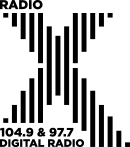Xfm
 |
|
| Broadcast area | London and Manchester (FM) United Kingdom (DAB) |
|---|---|
| Slogan | Get Into the Music |
| Frequency | 104.9 MHz (London), 97.7 MHz (Manchester), RDS: RADIO_X_DAB 11D (England, Wales, Northern Ireland) 12A (Scotland) Channel 0113 (Sky) Channel 723 Freesat Channel 621 (TalkTalk TV) Channel 960 (Virgin Media) Channel 923 (Virgin Media Ireland) |
| First air date | 1 September 1997 (as XFM) 21 September 2015 (as Radio X) |
| Format | Alternative music, rock music |
| Audience share | 1.4% (London), 1.9% (Manchester), 0.7% (total) (December 2015, [1]) |
| Owner | Global Radio |
| Sister stations |
Capital FM Heart Classic FM Smooth Radio Capital Xtra LBC Gold |
| Website | www |
Radio X is a commercial radio station brand focused on alternative music, primarily indie rock, which is owned by Global Radio. Radio X launched nationally on 21 September 2015 as a rebrand of Xfm and superseded Xfm London and Xfm Manchester.
The station has previously employed a number of DJs that have since gone on to even greater fame including Ricky Gervais, Karl Pilkington, Stephen Merchant, Simon Pegg, Christian O'Connell, Russell Brand, Justin Lee Collins, Adam and Joe, Alex Zane, Tim Lovejoy, Dermot O'Leary and Josh Widdicombe.
Xfm was created in London in 1992 by Sammy Jacob (who founded its precursor Q102) and Chris Parry. The station became full-time on 1 September 1997. During the following year the station played a range of music from its studios in 97 Charlotte Street, but mass appeal was thwarted by the lack of awareness due to an unsuccessful marketing campaign. Jacob would later go on to co-found NME Radio and CDNX (Camden Experience) in 2008 and 2015 respectively.
In 1998, Xfm was acquired by the Capital Radio Group (now part of Global Radio) and was relocated from Charlotte Street to Capital's headquarters at Leicester Square, where Radio X remains based today. On 23 August of that year was closed down for four days, during which a test tape featuring mainstream soft-rock acts was looped. The station subsequently relaunched with a more mainstream format, and a new advert featuring a cartoon radio saying "Don't be afraid!", which referred to the perceived inaccessibility of its old format. The soft-rock revamp was not a success, culminating in listener-led protests outside the Capital Radio studios. Listeners also lodged objections with the Radio Authority, which found XFM to be acting in a manner contrary to its licence requirements, and a degree of alternative output was eventually restored, particularly through night-time playlists and specialist shows.
...
Wikipedia
